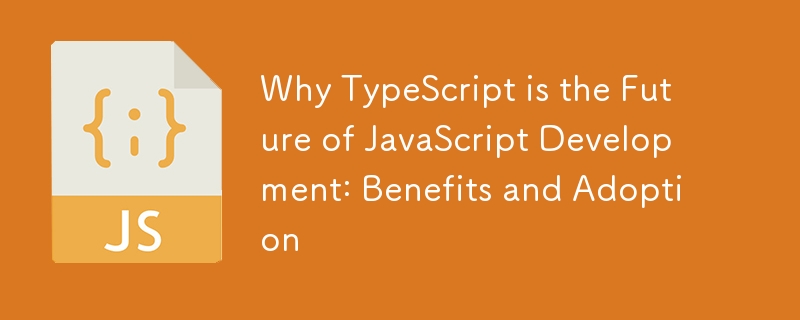
TypeScript Adoption: Why It's the Future of JavaScript Development
TypeScript (TS) has become one of the most important technologies in the JavaScript ecosystem. It's a statically typed superset of JavaScript that adds type annotations and other features to enhance developer productivity, maintainability, and code quality. If you haven't already adopted TypeScript, here’s why you should consider making the switch.
Top Reasons for Adopting TypeScript
-
Static Typing for Better Code Quality
- TypeScript's type system enables you to define types for variables, function parameters, and return values. This allows you to catch errors at compile-time rather than runtime, which helps to reduce bugs and improve code quality.
- Example:
function greet(name: string): string {
return `Hello, ${name}`;
}
greet(123); // Error: Argument of type 'number' is not assignable to parameter of type 'string'.
Copy after login
Copy after login
-
Improved Developer Experience (DX)
- TypeScript's rich type system and editor support (with autocompletion and inline documentation) significantly improve the developer experience. Features like type inference and error detection while coding make debugging faster and more efficient.
- IDEs like VSCode offer powerful TypeScript integration, making it easier to refactor, navigate, and understand code.
-
Better Collaboration and Maintainability
- In large projects or teams, TypeScript's explicit typing serves as documentation. It clarifies how functions, methods, and objects are expected to behave, reducing ambiguity and improving code maintainability.
- With clear type annotations, new developers can understand the codebase faster, and refactoring is safer, as types prevent many errors from sneaking through.
-
Seamless JavaScript Integration
- TypeScript is a superset of JavaScript, which means that any valid JavaScript code is also valid TypeScript code. This makes the adoption process gradual, allowing you to start with simple JavaScript and slowly migrate to TypeScript over time.
- It works well with popular JavaScript libraries and frameworks, such as React, Node.js, and Angular, where TypeScript has become the standard for new projects.
-
Enhanced Tooling and Ecosystem
- The TypeScript compiler (tsc) and tools like ts-node for Node.js, along with linting tools like ESLint, are designed to improve your workflow.
- TypeScript's rich ecosystem has grown, and many JavaScript libraries now provide type definitions or are built with TypeScript, ensuring you get type safety even when using third-party dependencies.
-
TypeScript with Modern JavaScript Features
- TypeScript supports all the latest ECMAScript features, such as async/await, destructuring, and modules. It compiles them down to JavaScript for older browsers or environments that don't support them natively.
- With TypeScript, you can use features like interfaces, enums, and tuples, which are not present in vanilla JavaScript but help create more structured and predictable code.
-
Large Community and Ecosystem
- TypeScript has a huge and growing community. It's used by major companies like Microsoft, Google, Slack, and Airbnb, and it has become the preferred language for many open-source projects.
- Type definitions are available for most JavaScript libraries through DefinitelyTyped, an open-source repository that provides TypeScript typings for over 500,000 libraries.
When to Start Using TypeScript?
-
Greenfield Projects:
- If you’re starting a new project, adopting TypeScript from the beginning is a no-brainer. You can design your code with types from the start and avoid refactoring later.
-
Existing Projects:
- Migrating to TypeScript from JavaScript is easier than ever. You can start by renaming your .js files to .ts or .tsx for React components, and TypeScript will allow you to add types gradually. You can opt for any type for portions of your code that are still in transition.
Popular TypeScript Use Cases
-
Frontend Development (React, Angular, Vue)
- TypeScript is especially popular in React and Angular projects, where it provides stronger typing for props, state, hooks, and components.
-
Backend Development (Node.js, Express)
- TypeScript’s strict types and interfaces make it a powerful tool for building scalable and maintainable backend services, especially with frameworks like Express and NestJS.
-
Library Development
- TypeScript is an excellent choice for developing libraries, ensuring that your library is easy to use and provides proper type definitions to consumers.
-
Testing and Documentation
- TypeScript’s types can serve as documentation for your functions and methods, making it easier for new developers to understand the code. It can also help prevent bugs in your test code by ensuring correct types and reducing runtime errors.
How to Get Started with TypeScript?
-
Install TypeScript:
To get started with TypeScript in your project, you first need to install it via npm or yarn:
function greet(name: string): string {
return `Hello, ${name}`;
}
greet(123); // Error: Argument of type 'number' is not assignable to parameter of type 'string'.
Copy after login
Copy after login
-
Configure TypeScript:
Initialize a TypeScript configuration file (tsconfig.json) with the following command:
npm install --save-dev typescript
Copy after login
-
Gradual Adoption:
- Rename .js files to .ts.
- Add type annotations to functions and variables.
- Use any where you can't define types immediately.
-
Use Type Definitions:
- Install type definitions for third-party libraries using npm. For example, for React:
npx tsc --init
Copy after login
Conclusion
Adopting TypeScript can drastically improve your development workflow, reduce bugs, and lead to cleaner, more maintainable code. Whether you’re working on small-scale applications or large enterprise-level projects, TypeScript is becoming an essential tool for modern JavaScript development. It’s never too late to start — and as its ecosystem continues to grow, so will the advantages of using TypeScript in your projects.
? What’s your experience with TypeScript? Have you adopted it in your projects yet? Share your thoughts below!
The above is the detailed content of Why TypeScript is the Future of JavaScript Development: Benefits and Adoption. For more information, please follow other related articles on the PHP Chinese website!






